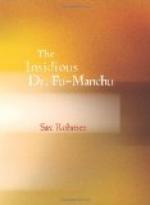“It is!” he cried aloud. “It is Sir Lionel’s servant, Kwee.”
Weymouth and I looked at one another across the body of the Italian; then our eyes turned together to where my friend, grim-faced, stood over the dead Chinaman. A breeze whispered through the leaves; a great wave of exotic perfume swept from the open window towards the curtained doorway.
It was a breath of the East—that stretched out a yellow hand to the West. It was symbolic of the subtle, intangible power manifested in Dr. Fu-Manchu, as Nayland Smith—lean, agile, bronzed with the suns of Burma, was symbolic of the clean British efficiency which sought to combat the insidious enemy.
“One thing is evident,” said Smith: “no one in the house, Strozza excepted, knew that Sir Lionel was absent.”
“How do you arrive at that?” asked Weymouth.
“The servants, in the hall, are bewailing him
as dead.
If they had seen him go out they would know that it
must
be someone else who lies here.”
“What about the Chinaman?”
“Since there is no other means of entrance to the conservatory save through the study, Kwee must have hidden himself there at some time when his master was absent from the room.”
“Croxted found the communicating door closed. What killed the Chinaman?”
“Both Miss Edmonds and Croxted found the study door locked from the inside. What killed Strozza?” retorted Smith.
“You will have noted,” continued the Inspector, “that the secretary is wearing Sir Lionel’s dressing-gown. It was seeing him in that, as she looked in at the window, which led Miss Edmonds to mistake him for her employer— and consequently to put us on the wrong scent.”
“He wore it in order that anybody looking in at the window would be sure to make that mistake,” rapped Smith.
“Why?” I asked.
“Because he came here for a felonious purpose. See.” Smith stooped and took up several tools from the litter on the floor. “There lies the lid. He came to open the sarcophagus. It contained the mummy of some notable person who flourished under Meneptah II; and Sir Lionel told me that a number of valuable ornaments and jewels probably were secreted amongst the wrappings. He proposed to open the thing and to submit the entire contents to examination to-night. He evidently changed his mind— fortunately for himself.”
I ran my fingers through my hair in perplexity.
“Then what has become of the mummy?”
Nayland Smith laughed dryly.
“It has vanished in the form of a green vapor apparently,” he said. “Look at Strozza’s face.”
He turned the body over, and, used as I was to such spectacles, the contorted features of the Italian filled me with horror, so— suggestive were they of a death more than ordinarily violent. I pulled aside the dressing-gown and searched the body for marks, but failed to find any. Nayland Smith crossed the room, and, assisted by the detective, carried Kwee, the Chinaman, into the study and laid him fully in the light. His puckered yellow face presented a sight even more awful than the other, and his blue lips were drawn back, exposing both upper and lower teeth. There were no marks of violence, but his limbs, like Strozza’s, had been tortured during his mortal struggles into unnatural postures.




